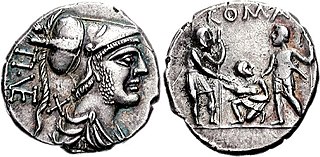See also
| Search for "Lucius Papirius Crassus" on Wikipedia. |
Lucius Papirius Crassus may refer to:
| Search for "Lucius Papirius Crassus" on Wikipedia. |
Gnaeus Papirius Carbo was thrice consul of the Roman Republic.
Gaius Papirius Carbo was an ancient Roman statesman and orator.
Gaius Papirius Carbo Arvina was a Roman orator and politician. He was an opponent of the reforms championed by the tribune Marcus Livius Drusus and the orator Lucius Licinius Crassus, and held the plebeian tribunate the year following Drusus's murder. He held senior state positions in the interlude between the civil wars of 87 and 83 BC, when his cousin, Gnaeus Carbo, dominated the government. Nevertheless, during the war in 82 his loyalty was seen as suspect, causing Arvina to be murdered by government agents during a meeting of the Senate.
Lucius Licinius Crassus was a Roman orator and statesman. He was considered the greatest orator of his day, most notably by his pupil Cicero. Crassus is also famous as one of the main characters in Cicero's work De Oratore, a dramatic dialogue on the art of oratory set just before Crassus' death in 91 BC.
The gens Papiria was a patrician family at ancient Rome. According to tradition, the Papirii had already achieved prominence in the time of the kings, and the first Rex Sacrorum and Pontifex Maximus of the Republic were members of this gens. Lucius Papirius Mugillanus was the first of the Papirii to obtain the consulship in 444 BC. The patrician members of the family regularly occupied the highest offices of the Roman state down to the time of the Punic Wars. Their most famous member was Lucius Papirius Cursor, five times consul between 326 and 313 BC, who earned three triumphs during the Samnite Wars. Most of the Papirii who held office under the later Republic belonged to various plebeian branches of the family. Although the most illustrious Papirii flourished in the time of the Republic, a number of the family continued to hold high office during the first two centuries of the Empire.
Gaius Maenius was a Roman statesman and general who was elected consul in 338 BC and appointed dictator twice, in 320 BC and 314 BC.

The gens Veturia, originally Vetusia, was an ancient patrician family of the Roman Republic. According to tradition, the armourer Mamurius Veturius lived in the time of Numa Pompilius, and made the sacred ancilia. The Veturii occur regularly in the Fasti Consulares of the early Republic, with Gaius Veturius Geminus Cicurinus holding the consulship in 499 BC. Like other old patrician gentes, the Veturii also developed plebeian branches. The family declined in the later Republic, with the last consular Veturius holding office in 206 BC, during the Second Punic War.
Gaius Furius Pacilus Fusus was a Roman statesman of the early Republic. He was a descendant of the ancient patrician house of the Furii, which filled the highest offices of the Roman state from the early decades of the Republic to the first century AD. He was probably closely related to Quintus Furius Pacilus Fusus, whom Livy mentions as Pontifex Maximus in 449 BC, and was likely the father of Gaius Furius Pacilus, consul in 412 BC.
Lucius Papirius Crassus was a Roman politician, becoming consul twice in 336 BC and 330 BC. Lucius Papirius was from the Papiria gens (family) in Rome.
Lucius Julius Iullus was a member of the ancient patrician gens Julia. He was one of the consular tribunes of 438 BC, magister equitum in 431, and consul in 430 BC.
Servius Cornelius Maluginensis was a politician and general of the Roman Republic. He was elected consular tribune seven times in 386, 384, 382, 380, 376, 370, and 368 BC. Despite having one of the most successful careers of the Republic, Servius' life is seldom known.
Manius Papirius Crassus was consul of the Roman Republic in 441 BC.
Lucius Papirius Crassus was a consul of the Roman republic in 436 BC and possibly a censor in 430 BC.
Marcus Cornelius Maluginensis was a consul of the Roman Republic in 436 BC.
Lucius Pinarius Mamercinus was a consular tribune of the Roman republic in 432 BC.
Gaius Papirius Crassus was a Roman senator who held the executive state office of consul in 430 BC, as the colleague of Lucius Julius. During their year in office, an eight year long truce may have been signed with the Aequi, but this is uncertain. The consuls also enacted a law which allowed for the payment of fines in cash instead of livestock, in response to some heavy fines levied by the censors, Lucius Papirius and Publius Pinarius. Although the initiative for this law had come from the plebeian tribunes, the consuls preempted them by introducing the measure themselves.
Marcus Furius Fusus was a consular tribune of the Roman Republic in 403 BC.
Lucius Aemilius Mamercinus was a Roman politician and general who, in the early 4th century BC, held the office of consular tribune an extraordinary six times in his distinguished, yet mostly unknown, career.